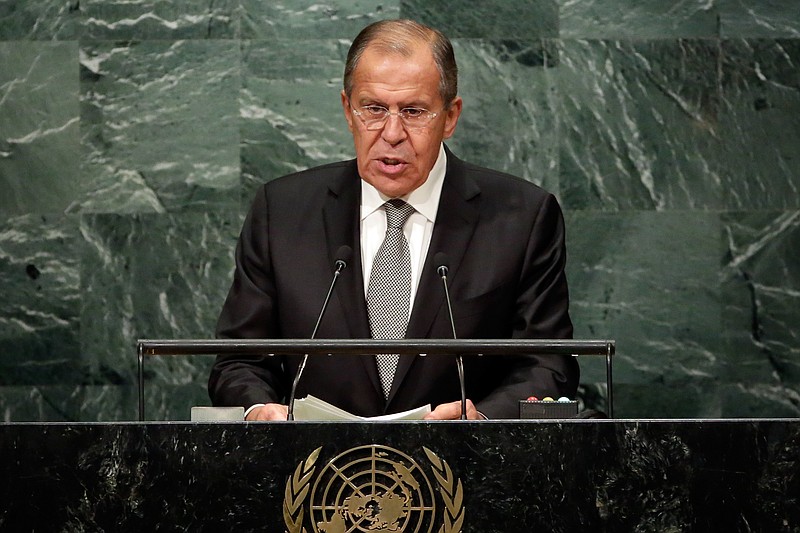UNITED NATIONS (AP) - Russian Foreign Minister Sergey Lavrov on Friday laid the blame for a "bleeding Middle East and North Africa" on the U.S. and its allies, in a speech to the U.N. General Assembly smacking of the kind of rhetoric that reflected the state of superpower relations during the Cold War.
In wide-ranging comments, Lavrov depicted Moscow's military involvement in Syria as crucial to efforts to prevent the crisis from spiraling even more out of control. He accused Ukraine of playing "zero-point games" instead of hewing to agreements meant to reduce the confrontation with his country. He criticized the doping bans on Russian athletes as politically motivated and reproached the West for allegedly stalling on nuclear arms reduction commitments and conventional disarmament.
Suggesting that the West was gripped by attempts to impose its own vision of a world order, Lavrov invoked George Orwell and his anti-utopian "Animal Farm" novel "where all animals are equal, but some are more equal." He accused the West of promoting their own interests to the detriment of others, through "mentoring, supremacy (and) exclusiveness."
Their "arrogant attitude and feeling of their infallibility in pushing forward unilateral hazardous solutions to the most complex conflicts and crises can be observed by the example of bleeding Middle East and North Africa," he said. "As a result, the basis of world stability is being destroyed."
Lavrov's comments reflected the latest spike in tensions between Moscow and Washington, with both sides blaming each other for the collapse of the latest efforts to find a peace formula for Syria.
"We can't go out to the world and say we have an agreement when we don't," Secretary of State John Kerry said after meeting the top diplomats from Russia and more than a dozen European and Middle Eastern countries and amid increasing Syrian fighting.
Syrian President Bashar Assad blamed the United States for the deal's failure in an AP interview earlier this week, citing U.S. inability to control "terrorist" groups and a weekend attack that killed dozens of Syrian soldiers. The U.S. apologized for what it described as a mistake, and Lavrov on Friday called for an "unbiased and impartial investigation" of the attack.
The war has killed as many as a half-million people, contributed to Europe's worst refugee crisis since World War II, and allowed the Islamic State group to emerge as a global terror threat. It has also drawn in Russia and the United States and regional rivals in the Middle East supporting various factions, creating a web of varying interests that have defied all attempts to reconcile.
Lavrov depicted his country's military assistance to Assad as the one positive counterweight to the chaos, saying it prevented "the collapse of the statehood and disintegration of that country under the onslaught of terrorists" and claiming it was the impetus to high-level - but for now ineffective - international attempts to resolve the conflict through diplomacy.
He blamed Washington for the failure of the latest peace effort, saying responsibility for lack of success in separating the "so-called moderate opposition from terrorists ... lies with the U.S. and members of the U.S.-led coalition."
Lavrov also was harshly critical of the leadership of Ukraine, where fighting continues to flare between Russian-supported separatists and government troops despite an agreement brokered with Moscow meant to stabilize the situation and lead to negotiations on the future of the country.
He blamed the Ukraine government and its backers of trying to use "the Ukrainian crisis to achieve corrupt political goals" - a strategy, he said that has "no prospects."
